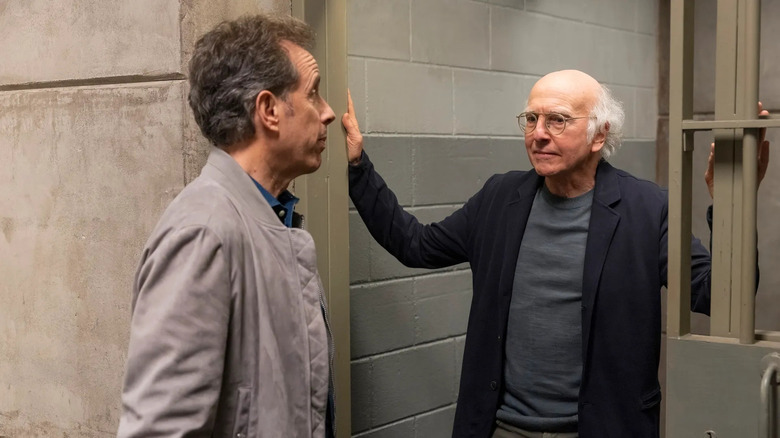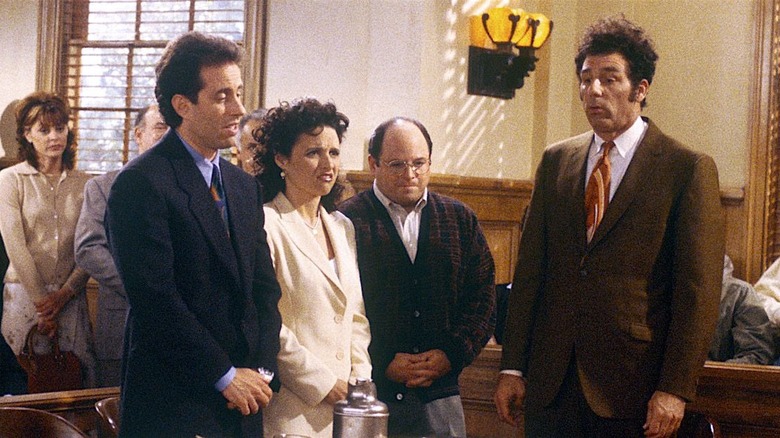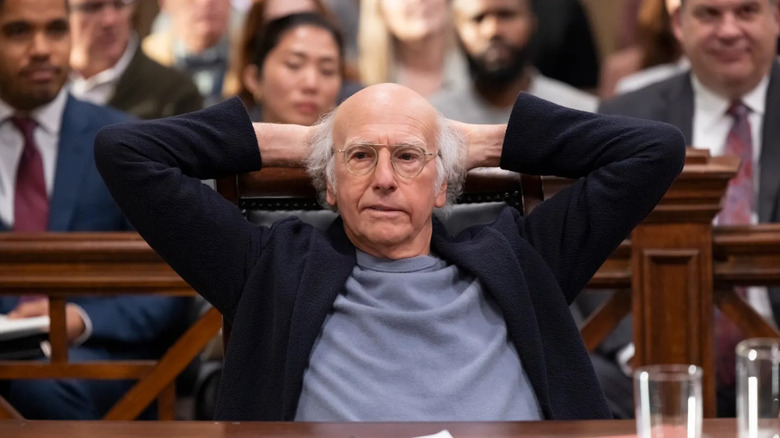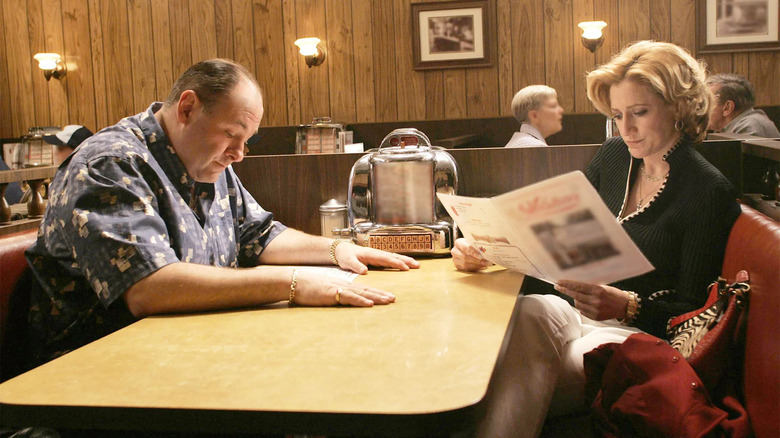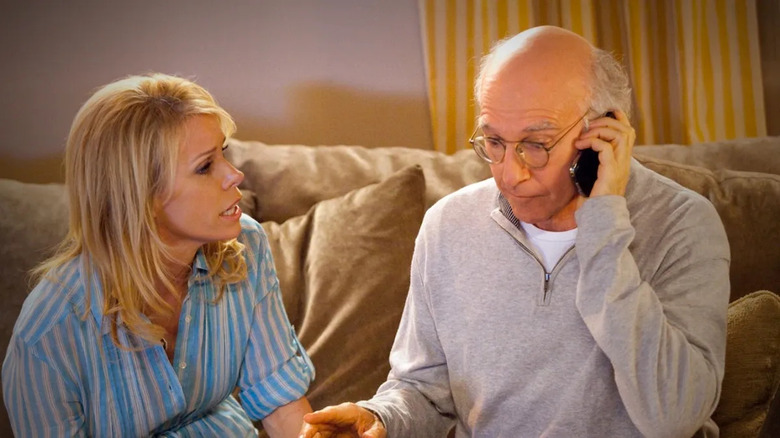Curb Your Enthusiasm's Finale Pulled Its Biggest Punch When Larry David Should've Doubled Down
This article contains spoilers for the "Curb Your Enthusiasm" series finale.
There've been plenty of controversial sitcom finales over the years, but few caught quite as much attention as the ending of "Seinfeld" in 1998. Whereas most sitcoms tend to leave their viewers with a warm fuzzy feeling, giving their characters a happy ending and promising better days ahead, "Seinfeld" threw Jerry, George, Elaine, and Kramer into prison for an entire year. In keeping with the rest of the show, there is no character growth for anyone in the main gang; they spend the finale being the same petty, apathetic people they always were, and they are punished for it.
Since then, the "Seinfeld" finale's long been considered one of the worst sitcom endings of all time. Although "How I Met Your Mother" took some of the heat off it with its own controversial ending, there was still a long cultural understanding that "Seinfeld" messed up and disappointed its fans by ending on a sour note.
This reaction has been a running gag on "Curb" throughout its entire 24-year run, with Larry repeatedly being confused and bewildered by how the finale was so despised. Never has the finale been brought up more, however, than in the final season. Nearly every episode of season 12 includes some mention of "Seinfeld" season 9, particularly the fun bit of trivia about how Larry David left the show after season 7 but then returned to do the controversial hour-long finale. This final episode, "No Lessons Learned," ups the "Seinfeld" references even further with a subplot about Leon (J.B. Smoove) binging the series for the first time. He enjoys the show, but hesitates to watch the finale, as he's heard some "bad things" about it.
No Lessons Learned
The "Curb Your Enthusiasm" finale presents the "Seinfeld" finale as a mistake to be atoned for. Larry David did a bad job with the finale, it claims, which leads to the big meta question of whether he's going to make the same mistake again with a similar trial-focused "Curb" finale. "No Lessons Learned" follows all the same narrative beats as the "Seinfeld" finale, right down to the whole format of having past guest stars testify against Larry by exposing the court to his many misdeeds over the years. Larry's also found guilty by the jury, and he also finds himself in a jail cell, casually talking about something he talked about back in the pilot.
For most of the finale, it feels like the meta joke is that Larry hasn't learned his lesson. As is emphasized in multiple conversations throughout the episode, Larry keeps making the same mistakes and stubbornly refusing to take any good advice the world might give him. Even the one lesson he claims to have accepted (not calling strangers "Captain"), he still repeats later anyway.
Most notably, the episode features a callback to the "not respecting wood" subplot in the season 7 finale. That's the episode where Larry almost saves his marriage with Cheryl after 10 episodes of trying to win her back, but he blows it at the last second because he makes a big deal over her not using a coaster for her drink. This time around, however, the finale goes in the opposite direction: instead of Larry snatching defeat from the jaws of victory, he's saved from near-certain doom. After a few moments in prison, Jerry Seinfeld reveals he's gotten Larry off on a technicality, and Larry gets the happy ending his "Seinfeld" characters were denied.
No need for corrections
"You don't wanna end up like this," Seinfeld tells Larry amidst the good news. "Nobody wants to see it. Trust me." As the two leave the jail, Larry remarks, "Oh my God, this is how we should've ended the finale," and Jerry responds, "Oh my God, you're right. How did we not think of that?" It's intended as a triumphant meta moment where, although TV Larry is haunted by this realization, real-life Larry has found a way to fix the mistake. He's giving audiences the "Seinfeld" ending he should've given them 26 years ago, the right way this time.
But is it the right way? Because as much as "No Lessons Learned" presents the "Seinfeld" finale as a mistake for Larry, there are plenty of "Seinfeld" fans (myself included) who don't think he's got anything to apologize for. The ending was harsh and unconventional, sure, but it was perhaps the most fitting end for the characters, not to mention the most thematically appropriate. The "Seinfeld" main characters have never been good people, after all, and the show itself has never had even an ounce of sentimentality or interest in genuine character growth. When characters do evolve over time, like Elaine to some extent, they certainly don't evolve for the better.
A happy ending on "Seinfeld" was never going to work, and the finale's choice of yanking the viewers out of the gang's perspective (giving us a clear, sobering glimpse of how they seem from the outside looking in) is both fascinating and a terrific comedic stroke. Shows like "Community" would go on to use the same trick, but "Seinfeld" did it first, and it did it before it was cool.
Not the Larry way
Maybe the most impressive part of the "Seinfeld" finale was how bold it was. So many mainstream stories are told in a frustratingly reactionary way, where you can feel the creators trying their best to do what they think the fans want them to do, even though most fans don't fully understand what they themselves want. It's an impossible juggling act that often leads to boring, lifeless movies and shows (cough, "The Rise of Skywalker"), which is why it feels like such a miracle whenever a showrunner takes the opposite approach. It's a big risk, one that'll inevitably anger a section of the fanbase for at least a little while, but it's an approach that will typically be appreciated more and more as time goes on.
But that's only the case if the creator doesn't apologize for it first. That's why the hate for the "Sopranos" finale has declined so much in the last 17 years: showrunner David Chase has always stood by it, making clear that he wouldn't change a thing no matter what the fans might say. Likewise, the "How I Met Your Mother" showrunners still stand by their ending, which will help their (unfairly hated) finale age better with time.
That's why Larry's insistence throughout "Curb" that the "Seinfeld" ending wasn't a mistake has always felt so admirable: every time he stood by it, he encouraged fans to give the finale another look, to watch it again under a more charitable gaze. But by apologizing for it now, Larry has now ceded ground to the finale haters. He's given them the ultimate win: official confirmation from the creator himself that the finale was a mistake. David has allowed the finale bashers to have the final word, even though the finale bashers are wrong.
Why it still works, sort of
If Larry David is reading this piece, which he probably isn't, he'd probably find it awfully frustrating. First, he was criticized relentlessly for putting the "Seinfeld" gang in prison, and now I'm criticizing him for getting Larry out of prison? It's a lose-lose situation, the type of thing fictional Larry deals with all the time. But I hope Larry understands that I'm purely concerned with the principle of the matter: if you're going to do a bold finale like he did with "Seinfeld," you should be prepared to stand by your work forever. Don't disavow it 26 years later, especially not after people have already started to come around.
But although "No Lessons Learned" was disappointing on a meta level, it did admittedly work pretty well if you ignore all that outside context. After all, this finale ends with Larry learning a lesson for the first time in his life, making for a fun, surprisingly hopeful moment to leave off his character. The fact that Larry admits his mistake with the "Seinfeld" finale (even though it wasn't a mistake) is a moment of genuine growth for him. Maybe this new Larry won't sabotage his chances at reconnecting with Cheryl over a water stain, the finale argues. Maybe post-Georgia Larry will have the self-control to let such minor disputes go for the sake of the greater happiness of both himself and those around him.
Of course, the episode's final scene features Larry arguing with Susie over a minor dispute, dashing those hopes of growth yet again. Fictional Larry will stay a petty, cranky old man 'til the end of his days; we just wish that real-life Larry could've been just as stubborn, at least when it comes to the "Seinfeld" finale.
